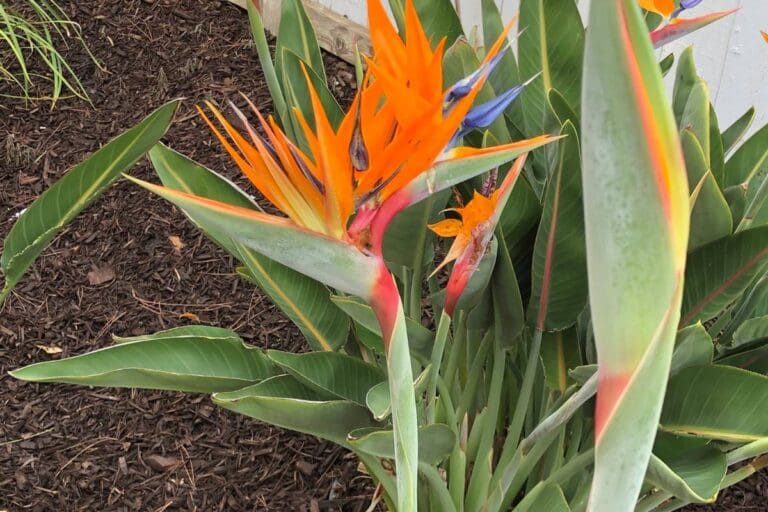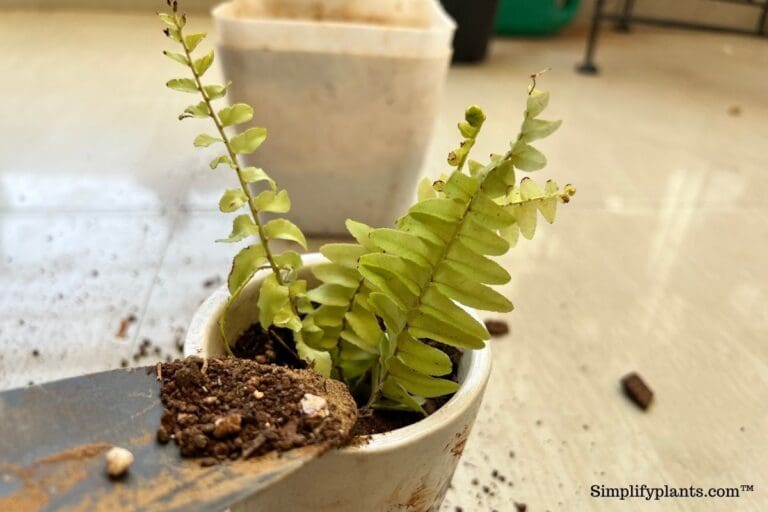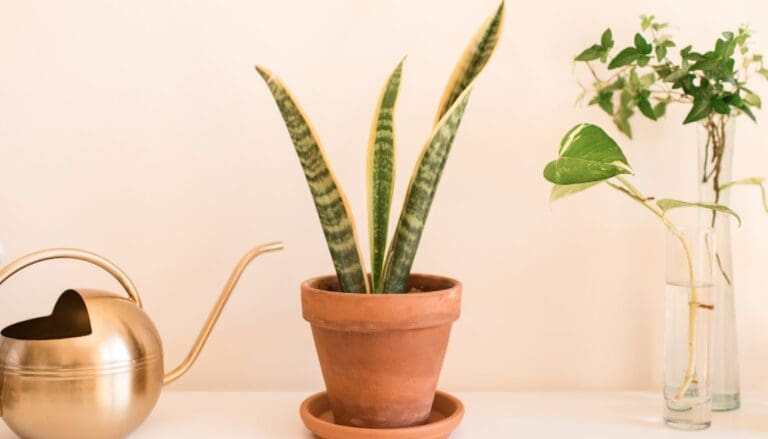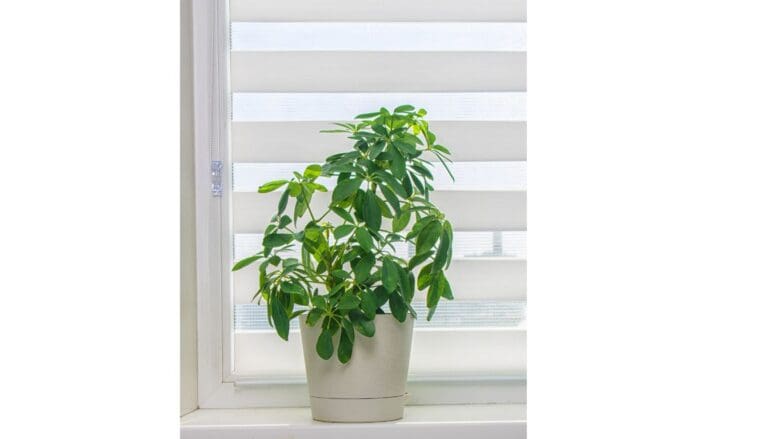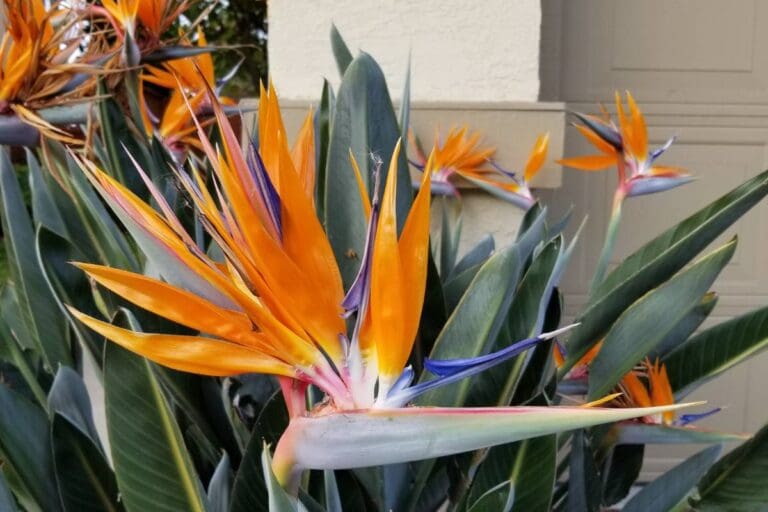Fertilizer For Pothos: What Type, How Much & More
One of the most beginner-friendly plants among many other houseplants is Pothos. They are easy to care for and relatively fast-growing plants. But will Pothos need to be fertilized? Let’s see.
Pothos must be fertilized for fast growth, good immunity, and an appealing appearance. Fertilize it with a liquid fertilizer every 4-6 weeks or with a slow-release fertilizer 1-2 times a year during the spring and summer. Avoid feeding during winter dormancy.
Fertilizing might seem to be easy initially. But once you dig deep, you will come across numerous options that can confuse you. During my 12 years of gardening, I have done a detailed study on this. Read this article till the end to receive detailed information about Pothos fertilization.
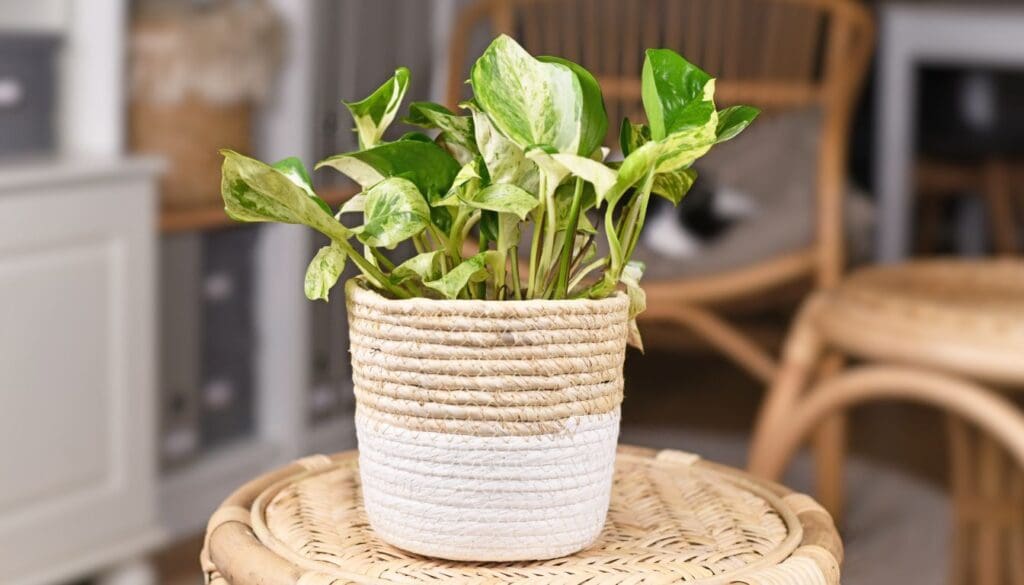
Please note: Simplify Plants is reader-supported. Some links in the post are affiliate links and I get a commission from purchases made through links in the post.
Fertilization fundamentals for the nutrition of your pothos
The big three nutrients (macronutrients) required for good growth are:
- Nitrogen
- Phosphorus
- Potassium
Besides these, the secondary nutrients (micronutrients) needed are:
- Calcium
- Magnesium
- Iron
- Sulfur
- Zinc
- Manganese.
- Copper
Both macro and micronutrients work together to improve Pothos’s overall health and growth.
Ensure the nutrient list on the product label of commercial fertilizers mentions these essential nutrients.
Choosing the correct type of fertilizer for Pothos
Several types of fertilizers are available in the market for Pothos.
But how will you choose the right one?
I always get DMs related to the fertilizer types for Pothos.
Besides that, also consider the NPK ratios as it has a significant role to play in choosing the right Pothos fertilizer.
Beginners are always confused when it comes to selecting the right fertilizer.
Let’s explore the different fertilizer types and the NPK ratios suitable for Pothos:
Organic vs. Synthetic fertilizer for pothos
There is a constant debate among gardeners about organic and synthetic fertilizers.
Different gardeners have diverse opinions about which one works better for Pothos.
Pothos can accept both if appropriately applied.
The chemicals in both types become identical after reaching the roots.
Synthetic fertilizers are refined chemicals mined from rocks, filtered from the air, and derived from petroleum waste materials.
They use specific formulations where you know the nutrient quantity.
It works faster because it is formed in a way that Pothos can easily digest.
Synthetic fertilizers have highly concentrated nutrients and salts.
Small doses of application are recommended.
On the other hand, organic fertilizers are made by breaking down plants, animals, and animal waste.
They are natural and don’t pose any threat to Pothos.
The resulting molecules are more intricate than the refined salts of the synthetic fertilizers.
It is similar to how Pothos get nutrients in the wild.
Instead of a sudden burst, the nutrients get released slowly and steadily without any root burn risk.
Additionally, organic fertilizers feed the microbes in the soil, which further pass these nutrients to the plant parts, thus making a diverse soil ecosystem and improving aeration.
However, organic fertilizers are costlier compared to synthetic fertilizers.
Whether you choose an organic or a synthetic fertilizer depends on you.
You can use synthetic fertilizers if your budget is low and you want fast progress in Pothos.
Go for organic fertilizers to reduce the risk of fertilizer burns and chemical damage in Pothos.
Liquid vs. Slow-release fertilizer for pothos
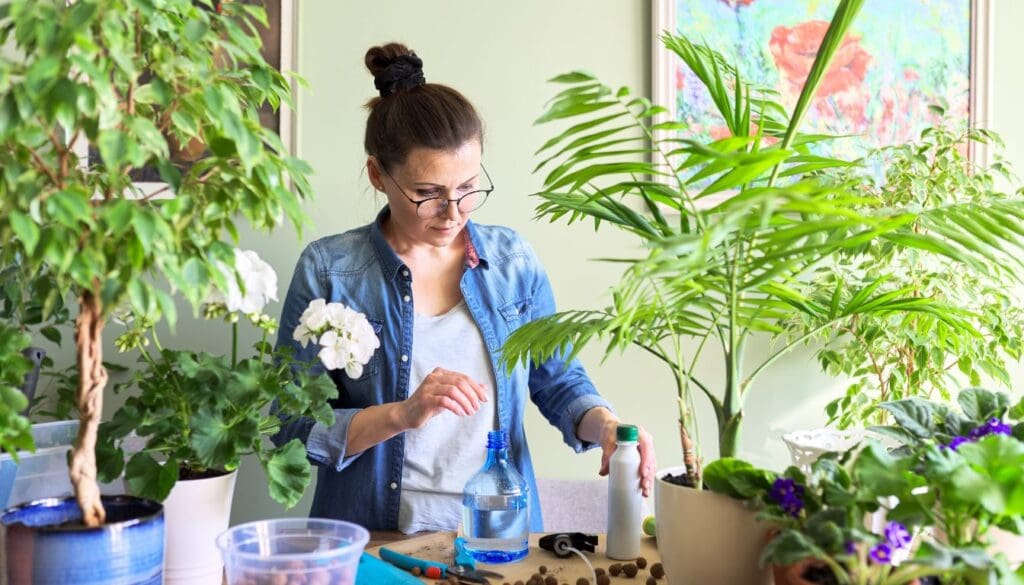
Will Pothos like a quick boost of fertilizer or the one where nutrients break down slowly in the soil?
Pothos will accept both, based on the situation and plant condition.
If Pothos needs urgent nutrition, use a liquid fertilizer.
Since it comes in a liquid form, the plant can easily absorb the nutrients without any problem.
Liquid fertilizers are absorbed quickly and should be applied more frequently.
Slow-release fertilizers are good to prevent overfertilization.
When nutrients get released into the soil slowly, their concentrations remain lower.
Slow-release fertilizers act gradually and stay active for too long.
So, you need to feed your plant less often, like only 1-2 times a year.
Organic fertilizers are also slow-release fertilizers.
But there are also artificial slow-release fertilizers like pellets or spikes.
Nutrient ratios and formulas in Pothos fertilizer
We have already discussed the nutrients Pothos needs.
When choosing a fertilizer, you need to check the formulations and NPK ratios to choose the best one for Pothos.
NPK stands for Nitrogen (N), Phosphorus (P), and Potassium (K).
The NPK value helps you understand the ratio of the macronutrients present in the fertilizer.
For example, if the fertilizer says 4-4-4 NPK, it contains 4% each of nitrogen, phosphorus, and potassium.
The rest are the micronutrients in small percentages.
Pothos responds well to a balanced fertilizer with an NPK ratio of 10-10-10 or 20-20-20.
You can also choose fertilizers having a different NPK, but a balanced one works better.
Besides, it is an easier option for beginners who get confused about choosing the right type of fertilizer.
When and how often to fertilize Pothos?

Pothos should be fertilized to grow fast, prevent nutrient deficiencies, boost immunity to fight several problems and infestations, and improve their appearance.
But these are only possible if you fertilize your Pothos correctly.
Correct fertilization practice is essential.
Practicing good fertilization and understanding the right time and frequency of fertilizer applications for Pothos will help you get the most out of it.
The right time to fertilize Pothos and seasonal considerations
The best time to fertilize Pothos is during the actively growing seasons, spring and summer.
Pothos will absorb maximum nutrients during these seasons to grow fast, stay strong, fight problems, and increase vigor.
Avoid fertilizing Pothos during the winter.
It stays dormant in the cold and won’t need the nutrients.
If you still feed it, the result will be over-fertilization and root burns.
Based on your room temperature, fertilize during the end of the winter to provide your Pothos an early spring boost.
Don’t be too early unless you are applying a slow-release fertilizer.
Liquid fertilizer acts fast, and the nutrients are available for a very short time.
If the plant is still not correctly active, it won’t be able to absorb the nutrients.
Reduce the frequency when the temperature starts reducing in the fall.
Stop feeding when the temperature goes below 55°F in winter.
Pothos fertilization schedule and frequency
If you use slow-release fertilizers, apply them only 1-2 times a year.
It releases nutrients slowly and remains active for several months.
Liquid fertilizers release nutrients faster for a quick boost.
Hence, the nutrients are available for a very short time, and the plant can use them very quickly.
In that case, you must apply fertilizers every 4-6 weeks.
Organic fertilizers need to be used every 2-3 months.
Best fertilizers for Pothos
I get a lot of emails and DMs where readers ask me about some good fertilizers for Pothos.
So, I thought of sharing some best fertilizers that have worked for my Pothos.
I love experimenting, and I am a big fan of Pothos.
I have too many Pothos plants and have tried several types of fertilizers.
In this section, I will share a handful of fertilizers you can use for Pothos without putting extra effort into searching for the right one.
Commercial liquid fertilizers for Pothos
- Dyna Gro Foliage Pro Liquid Plant Fertilizer
- Jack’s Classic All Purpose Fertilizer, 20-20-20
- Miracle-Gro Indoor Plant Food
- Bonide 037321001089 Liquid Plant Food 10-10-10
- Triple 10 All Purpose Liquid Fertilizer 10-10-10 with Amino Acids (5.5%) & Seaweed Extract
Dilute your fertilizer to ½ of the recommended strength.
Make the concentration to ¼ strength for the younger Pothos.
For dilution, mix ¼ teaspoon of the fertilizer with every 1-quarter of water and ½ teaspoon for every 1 gallon of water.
Use room temperature water, stir well, and water the plant thoroughly with the solution.
For more, follow the instructions given on the product label.
Granular time-release fertilizers for Pothos
- Osmocote Smart-Release Plant Food Plus
- Jobe’s Organics 09526 Organic All-Purpose Granular Fertilizer
Use coated or slow-release varieties made for indoor Pothos.
Some granular fertilizers are quick-release, but I won’t suggest using them for Pothos.
These granular fertilizers are some of the best options.
Spread granules around the soil, mix them thoroughly, and water the soil to activate the fertilizer for even spreading.
Consult the packaging for dosage.
Apply 1-2 times during the growing season.
Slow-release spike fertilizers for Pothos

- EarthPods Organic Indoor Plant Fertilizer Spikes
- Jobe’s 05231T Flowering Plant Fertilizer Spikes
- Osmocote Smart-Release Plant Food Plus Outdoor & Indoor
Apply according to the instructions provided on the package label.
Use lower suggested rates for your potted Pothos. Apply it only 1-2 times a year.
Organic and homemade fertilizers for Pothos
- VermisTerra Earthworm Castings 10 LB Standard
- Compost or well-rotted manure adds beneficial microbes and organic matter. The nutrients get slowly released while improving aeration. Mix 2-3 tablespoons of compost with the soil for every 6-inch pot. Apply it every 2-3 months.
- You can also use garden store-purchased compost blends. Apply it in the same way as you use organic compost.
- I have tried some DIY liquid fertilizers for Pothos. These are organic and very effective. Here are the options:
- Collect the old aquarium water, let it sit for an hour, pour the clean water into a mug, and water your Pothos with it every 1-2 weeks.
- Add 1 tablespoon of used coffee grounds for every 6-inch potting mix. Mix it with the top 2 inches of the soil every 2-3 months.
- Boil rice or potato, collect the water, let it cool, and water your Pothos every 2-4 weeks.
- Collect eggshells from 4-6 eggs, let them dry, crush, and soak them in water for a day. Strain the liquid and water your Pothos 1-2 times a month.
- Collect worm compost in a bag, tie it tightly, and soak the bag in 2-gallon water to let the food mix with the water. Once the water turns brown, remove the bag, and use the water to feed your Pothos every 3-4 weeks.
- Mix 1-2 tablespoons of Epsom salt with 1-gallon water and spray it on your Pothos once or twice a month.
Fertilization troubleshooting guide: Overfertilization and under-fertilization
You will face two main problems when it comes to fertilizing Pothos:
- Underfertilization, if you don’t fertilize your Pothos regularly.
- Overfertilization, if you have to feed your Pothos in more amounts or more frequently
Under fertilizing Pothos
The soil mix you use for Pothos contains enough nutrients initially, so you don’t need to feed the plant for a few weeks.
Some store-bought potting mix contains additional fertilizer.
You don’t need to feed Pothos for 3-6 months.
But soil alone cannot provide all the nutrients.
So, you must fertilize.
If you don’t feed Pothos, it will suffer from underfertilization and become weak and susceptible to infestations.
Here are some symptoms of nutrient deficiency in Pothos:
- Yellow or pale leaves
- Slow or stunted growth
- Leggy and sparse vines
- Leaves falling off the plant
- Leaves are relatively smaller
- Stems are drooping due to weakness
These signs also indicate something is wrong with watering, temperature, light, humidity, or soil.
But if these requirements are correct, recall the last time you fertilized Pothos. If it’s been a year, fertilize it now.
Begin with a liquid fertilizer for a quick dose once you notice these symptoms.
Once your plant shows signs of new growth, you can continue using the liquid fertilizer or go for slow-release or organic fertilizer.
Overfertilizing Pothos
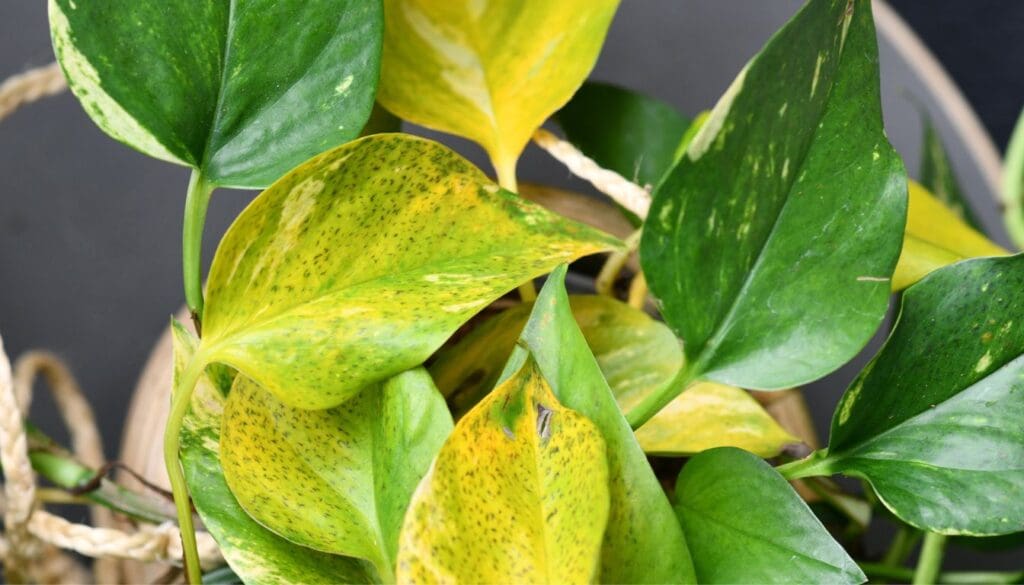
While Pothos can benefit from fertilizing, too much fertilization is not the right thing to do.
The main reason is the excessive use of synthetic fertilizers, which contain high concentrations of salts and chemicals.
When the salts accumulate in the soil and reach the roots, they burn them.
With damaged roots, the plant struggles to absorb moisture and nutrients.
Some signs of over-fertilization in Pothos are:
- Leaves having brown edges and tips
- Dark spots or streaks on the leaves
- Curly and dry leaves
- Poor root growth
- Wilting and discoloration despite proper watering and good-quality soil
- Sudden leaf loss
- White crust on the soil surface
- Stunted growth
If you have overfertilized your plant, stop fertilizing and your plant’s reaction for a few weeks.
If your Pothos is doing well, the problem is solved.
If you still see these signs, flush off the soil. Water the soil deeply until the excess drains out, let the soil dry, and again water it.
Do it 2-3 times until all the accumulated salts get washed out of the soil.
Stop feeding your plant for a few weeks until you notice signs of recovery.
Use compost tea or foliar spray to provide the beneficial nutrients.
If Pothos doesn’t recover, replace the soil with a new potting mix.
To prevent over-fertilization:
- Follow the label on the product for the correct dilution rates and doses.
- Use less amount or reduce frequency. Less is more and better than overfeeding.
- Flush off the soil regularly.
- Use organic or slow-release fertilizers.
Final thoughts
While Pothos is not a heavy feeder, it will benefit from regular fertilization. Pothos must be fertilized for fast growth, immunity, and strength to fight problems. There are different types of fertilizers – organic, synthetic, slow-release, and liquid. You can choose anyone for Pothos. Ensure the fertilizer contains the essential nutrients and correct NPK value Pothos requires.
I have shared multiple fertilizer options, both commercial and homemade. You can choose any one of them. I have used most of them, and my Pothos have always thrived. Water your Pothos before and after applying fertilizer to prevent root burns and ensure proper dissolution. Your Pothos shows discoloration or stunted growth if you haven’t fertilized it too long.
Give a quick boost with a balanced liquid fertilizer. Brown leaves, stunted growth, or defoliation despite fertilizing are signs of overfertilization. Stop feeding and flush off the soil to remove the accumulated salts. If it doesn’t work, replace the entire soil. Take good care of your Pothos and fertilize correctly to witness your Pothos thriving with lots of leaves and adding aesthetic value to your room.
Are coffee grounds reasonable for Pothos?
Coffee grounds can provide enough nutrients to your Pothos to promote photosynthesis, chlorophyll, and good development. However, please don’t use too much or depend solely on it.
Can I use fish emulsion for Pothos?
Yes, you can use it. Fish emulsion is a great supplier of macronutrients. Add one cup of fish emulsion with ½ seaweed extract or ½ cup of kelp meal and 1 tbsp of honey or molasses. Apply it every 2 weeks.
Reference: Pothos Wikipedia, Fertilizer Wikipedia
Recommended Garden Supplies
| Product Image | Our Recommended Gardening Supplies | Check Offers! |
|---|---|---|
Top Top
Top
Top
Top
Top
Top
Top
Top | rePotme Houseplant and Tropical Classic Potting Soil Mix | Check Offer On Amazon |
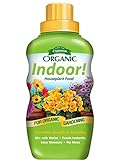 Top
Top
Top
Top
Top
Top
Top
Top | Espoma Organic Indoor Plant Food | Check Offer On Amazon |
 Top
Top
Top
Top
Top
Top
Top
Top | GooingTop LED Grow Light 6000K Full Spectrum Clip Plant Growing Lamp | Check Offer On Amazon |
 Top
Top
Top
Top
Top
Top
Top
Top | Soil Moisture Meter | Check Offer On Amazon |
 Top
Top
Top
Top
Top
Top
Top
Top | Govee Hygrometer Thermometer, Bluetooth Enabled! | Check Offer On Amazon |
 Top
Top | LEVOIT Humidifiers for Large Room(Best For Plants) | Check Offer On Amazon |
 Top
Top
Top
Top
Top
Top
Top
Top | Upgraded DIY Automatic Drip Irrigation Kit, 15 Potted Houseplants Support | Check Offer On Amazon |
 Top
Top
Top
Top
Top
Top
Top
Top | Stainless Steel Heavy Duty Gardening Tool Set | Check Offer On Amazon |
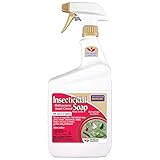 Top
Top
Top
Top
Top
Top
Top
Top | Bonide Insecticidal Soap | Check Offer On Amazon |
 Top
Top
Top
Top
Top
Top
Top
Top | Bonide 32 oz Spray Neem Oil for Organic Gardening | Check Offer On Amazon |
 Top
Top
Top
Top
Top
Top
Top
Top | Garden Safe Fungicide | Check Offer On Amazon |

